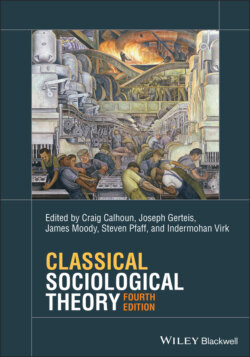Читать книгу Classical Sociological Theory - Группа авторов - Страница 58
Karl Polanyi
ОглавлениеLiberal thought confronted its greatest challenges in the wake of the First World War (1914–1918). Industrialized European societies had gone blindly into war and the devastating consequences of what became a total conflict left millions dead, economies in tatters, and progressive confidence in modernity shattered. In the aftermath, the victors and the vanquished alike experienced economic crises and political instability. Could capitalism and democracy survive? Had liberalism been eclipsed in advanced industrial societies by the totalitarian, statist ideologies of communism and fascism? Polanyi’s thought can be seen as a bridge between classical liberalism and the emerging social democracies in industrial societies after the Second World War that sought answers to these questions.
Karl Polanyi was born in Vienna, the capital of the cosmopolitan Austro-Hungarian Empire, and grew up in Budapest, its second city. He belonged to an illustrious circle of radical intellectuals and social reformers. Like many intellectuals, he shared the shocking experience of the collapse of the Austrian monarchy in World War One. Defeat in the world war brought economic hardship, social polarization, and political radicalization to Central and Eastern Europe. Whatever its faults, the end of the monarchy also challenged the ideals of capitalist development, rational bureaucracy, and the rule of law. In many interwar countries, democracy was under threat from both communist and right-wing reactionary movements that promised to unseat liberalism, unify society in the name of a greater collectivity, and overcome free-market capitalism. Being a left-wing critic of fascism and a secularized Jew, Polanyi was forced into exile by rising Nazi influence in Austria. He fled to England, then the United States.
Published in 1944, The Great Transformation sought to explain how the industrial, market society developed during the 19th Century entered a period of deep crisis. This was marked by two world wars and the Great Depression between them. Industrial capitalism brought massive disruption to both agriculture and craft work. Liberalism, as embraced by elites, had protected private property but not the social fabric of communities. The ideology of free markets “disembedded” economic transactions from both social support systems for workers and social responsibility for capitalists. Liberal economists argued against benefits that could help unemployed workers, saying these might stop them from finding new jobs. New wealth was created but at great social cost. The result was massive uprooting and class division rather than unified society. These domestic problems were matched by international disorder shaped by imperialism, rapid globalization of markets, and expansion of debt and finance. Together, these produced the first step in what Polanyi called a “double-movement”. Disruption demanded response. Fascism was one response. There were also efforts to create effective democratic or socialist responses but they were not strong enough to prevent the breakdown of the early 20th century. It remained crucial to build new institutions for the social integration and welfare of all members of democratic societies. After World War Two, this project – sometimes called social democracy or the welfare state – became a priority for almost all democratic societies.
Citizens demanded social protection and supports from health care and education to old-age pensions. Wherever democracy expanded, ordinary citizens mobilized to limit capitalism. The labor movement, socialist parties, protective legislation, economic redistribution, and efforts to regulate capital were all expressions of the democratic rejection of liberalism and the morality of possessive individualism.
Polanyi’s thought is a powerful critique of classical liberalism and disembedded individualism. He argued that by itself free-market capitalism was unsustainable and destructive, but also that reforms and institution-building could stabilize it and reduce its negative effects. Polanyi was influenced by Marx, but did not believe revolution was the only path to a better society (and also thought it could backfire). Liberal freedoms were important to democracy, but economic liberalism needed to be complemented by more commitment to social justice and social relations. In recent years, there has been revival of interest in Polanyi. Many see echoes of his account of the Great Transformation in the neoliberal globalization of markets that undermined industry and local communities in the US and much of Europe. Polanyi remains influential as a leading figure in historical sociology and in the school of social economics.
